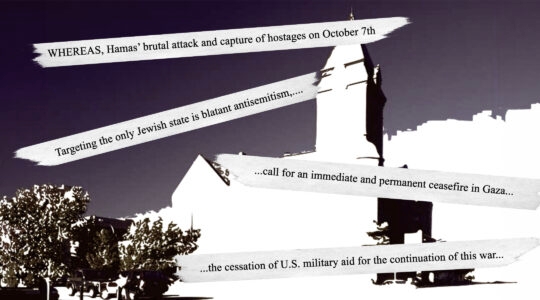FIRST PERSON
COLUMBUS, Ohio (JTA) — In September 1984, Ronald Reagan visited what he called the “Valley of Opportunity,” a region in New York’s southern tier that encompasses the triple cities of Binghamton, Johnson City and Endicott.
President Reagan spoke of the area’s industrial origins and the past prosperity of one of its storied businesses, the Endicott Johnson Shoe Corp. He noted that job opportunities at Endicott Johnson once were known throughout Europe. Immigrants from Poland, Russia, Czechoslovakia, Italy and a dozen other countries came to America’s shores armed with only their dreams and a few simple words of English: “Which way EJ?”
That one-liner was all they needed to find their way to new lives in the Valley of Opportunity.
“They asked only for the chance to work,” the president said. “Family helped family and neighbor helped neighbor, schools were built, houses were constructed, churches and synagogues were established. And this valley became home to some of the proudest communities in our nation, towns that had seen firsthand all that free men and women can accomplish.”
As a student at SUNY Binghamton in the 1970s, I studied the life of the immigrant communities that helped build the Triple Cities. Using census data spanning nearly a century, I researched intra-urban ethnic migration patterns in Binghamton, tracking down the dwelling places of its first Italian newcomers. I mapped their mobility and pursuit of the American dream over three generations and recorded the ethnic origins of those who followed in their footsteps.
My first job after college was as a community planner at Binghamton’s United Way. One of my frequent stops was the American Civic Association. It was headed by a very competent director, Anna Marie deLaurentis. She was a busy lady. In 1978, her agency served 1,385 people. Of that number, 34 percent were new arrivals.
The organization was deeply involved at the time with the “boat people.” The American Civic Association sponsored 200 Vietnamese refugees that year, finding them clothes, homes, employment and other essentials for which it received government resettlement grants of $250 per person.
In addition to the Vietnamese, deLaurentis’ staff and volunteers helped resettle other new Americans, including Jews from Rome, Eastern Europeans and a number of Lebanese refugees. The association’s entire annual budget was $65,776. To keep its budget lean, the association did not carry medical insurance for its staff.
After several years at the United Way, I became director of the Jewish federation in Binghamton, which served a small Jewish community where everyone knew each other. One of its volunteers was a woman with 10 children named Roberta King. Everyone called her Bobbie. She taught English as a second language. Quite recently, at age 72, she began volunteering at the American Civic Association, where she lost her life last week at the hands of a Vietnamese immigrant named Jiverly Wong. It’s not known why Wong killed Bobbie, 12 others and then himself. Clearly, however, Binghamton was not his valley of opportunity.
Until the Cold War ended, the Triple Cities never experienced an economic downfall, due in part to its defense-heavy industries. The area was the birthplace of IBM, Singer Link and Eureka Tents, and is the headquarters of Universal Instruments and McIntosh Laboratories. Dr. Andral Kilmer’s famous patent medicine Swamp Root for many years was shipped worldwide from a huge factory on Chenango and Lewis streets.
Times have changed since Binghamton’s heyday. A cigar industry that employed 6,000 hands at 50 locations is but a distant memory. The Endicott Johnson factories and tanneries that once had 20,000 people on the payroll are demolished, victims of changing styles, bad management decisions and cheap foreign labor. IBM, with 388,000 employees worldwide, is now based elsewhere. The city’s last Agfa cameras rolled off the production lines in the 1990s. Many of Binghamton’s stately homes are now funeral parlors.
When employed, Jiverly Wong earned $9 an hour. While on unemployment, he received $200 a week. With his limited English, he once told a co-worker that America sucks.
Bobbie King, whose memorial service was at Temple Concord — housed in Kilmer’s former mansion — would have disagreed.
(Jackie Jacobs is executive director of the Columbus Jewish Foundation.)





